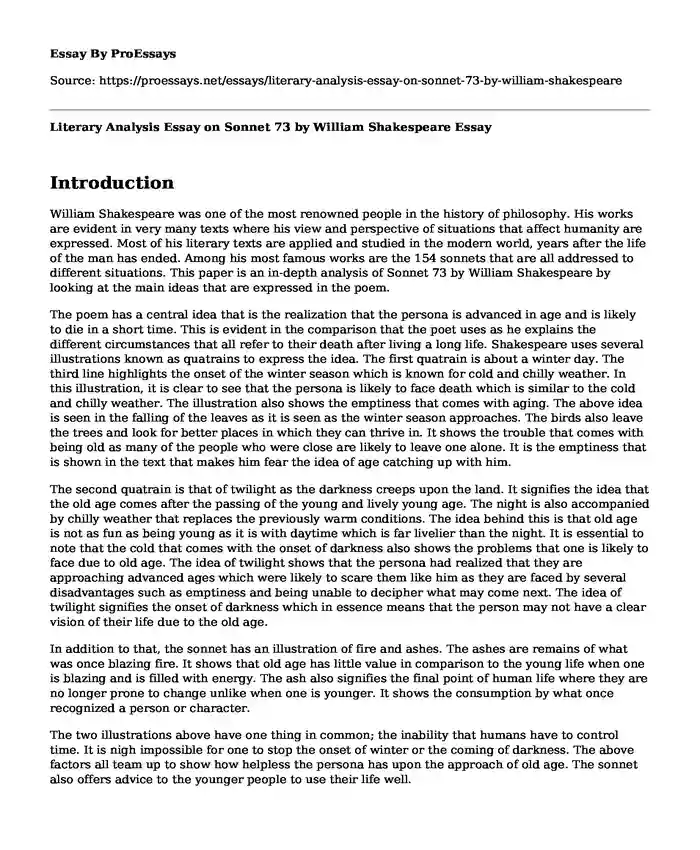Introduction
William Shakespeare was one of the most renowned people in the history of philosophy. His works are evident in very many texts where his view and perspective of situations that affect humanity are expressed. Most of his literary texts are applied and studied in the modern world, years after the life of the man has ended. Among his most famous works are the 154 sonnets that are all addressed to different situations. This paper is an in-depth analysis of Sonnet 73 by William Shakespeare by looking at the main ideas that are expressed in the poem.
The poem has a central idea that is the realization that the persona is advanced in age and is likely to die in a short time. This is evident in the comparison that the poet uses as he explains the different circumstances that all refer to their death after living a long life. Shakespeare uses several illustrations known as quatrains to express the idea. The first quatrain is about a winter day. The third line highlights the onset of the winter season which is known for cold and chilly weather. In this illustration, it is clear to see that the persona is likely to face death which is similar to the cold and chilly weather. The illustration also shows the emptiness that comes with aging. The above idea is seen in the falling of the leaves as it is seen as the winter season approaches. The birds also leave the trees and look for better places in which they can thrive in. It shows the trouble that comes with being old as many of the people who were close are likely to leave one alone. It is the emptiness that is shown in the text that makes him fear the idea of age catching up with him.
The second quatrain is that of twilight as the darkness creeps upon the land. It signifies the idea that the old age comes after the passing of the young and lively young age. The night is also accompanied by chilly weather that replaces the previously warm conditions. The idea behind this is that old age is not as fun as being young as it is with daytime which is far livelier than the night. It is essential to note that the cold that comes with the onset of darkness also shows the problems that one is likely to face due to old age. The idea of twilight shows that the persona had realized that they are approaching advanced ages which were likely to scare them like him as they are faced by several disadvantages such as emptiness and being unable to decipher what may come next. The idea of twilight signifies the onset of darkness which in essence means that the person may not have a clear vision of their life due to the old age.
In addition to that, the sonnet has an illustration of fire and ashes. The ashes are remains of what was once blazing fire. It shows that old age has little value in comparison to the young life when one is blazing and is filled with energy. The ash also signifies the final point of human life where they are no longer prone to change unlike when one is younger. It shows the consumption by what once recognized a person or character.
The two illustrations above have one thing in common; the inability that humans have to control time. It is nigh impossible for one to stop the onset of winter or the coming of darkness. The above factors all team up to show how helpless the persona has upon the approach of old age. The sonnet also offers advice to the younger people to use their life well.
Works Cited
Shakespeare, William. The sonnets. Vol. 26. Cambridge University Press, 1996.
Cite this page
Literary Analysis Essay on Sonnet 73 by William Shakespeare. (2022, Nov 03). Retrieved from https://proessays.net/essays/literary-analysis-essay-on-sonnet-73-by-william-shakespeare
If you are the original author of this essay and no longer wish to have it published on the ProEssays website, please click below to request its removal:
- Research Paper Example on The Yellow Wallpapers by Charlotte Perkins
- A Temple of the Holy Ghost by Flannery O'Connor - Critical Essay
- Alice in Wonderland and Through the Looking Glass Essay Example
- Mythology Book Report and Review Paper Example
- Essay Example on Cassio & Bianca: An Apology, Assurance, and Jealousy
- Principles of Literary Study for Poetry Paper Example
- Streetcar Named Desire by Tennessee Williams - Essay Sample







